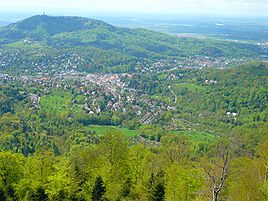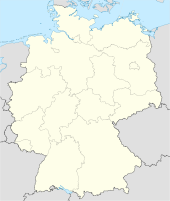- Baden-Baden
-
For the racehorse, see Baden-Baden (horse).
Baden-Baden View of Baden-Baden from Mount Merkur. 
Coordinates 48°45′46″N 8°14′27″E / 48.76278°N 8.24083°ECoordinates: 48°45′46″N 8°14′27″E / 48.76278°N 8.24083°E Administration Country Germany State Baden-Württemberg Admin. region Karlsruhe District Urban district Mayor Wolfgang Gerstner (CDU) Basic statistics Area 140.18 km2 (54.12 sq mi) Elevation 181 m (594 ft) Population 54,445 (31 December 2010)[1] - Density 388 /km2 (1,006 /sq mi) Other information Time zone CET/CEST (UTC+1/+2) Licence plate BAD Postal codes 76530–76534 Area codes 07221, 07223 Website baden-baden.de Baden-Baden is a spa town in Baden-Württemberg, Germany. It is located on the western foothills of the Black Forest, on the banks of the Oos River, in the region of Karlsruhe. Its sister city is Menton, France.
Contents
History
The German word, 'Baden,' translates as 'baths.' The springs of Baden-Baden were known to the Romans, and the foundation of the town refers to the emperor, Hadrian, with an inscription of somewhat doubtful authenticity. The bath-conscious Roman emperor, Caracalla, once came here to ease his arthritic aches.[2] Baden was also known as Aurelia Aquensis, in honour of Aurelius Severus, during whose reign Baden would seem to have been well known. Fragments of its ancient sculptures are still to be seen, and, in 1847, the well preserved remains of Roman vapour baths were discovered just below the New Castle.
The town was named Baden (without the repetition) in the Middle Ages. The town fell into ruin but reappeared in 1112 as the seat (until 1705) of the margravate of Baden.[3] From the 14th century to the end of the 17th, Baden-Baden was the residence of the margraves of Baden, to whom Baden-Baden gave its name. The margraves first dwelled in the old castle, the ruins of which still occupy the summit above the town, but, in 1479, they moved to the new castle, which is situated on the hillside nearer to the town. During the Thirty Years' War and the Nine Years' War, Baden-Baden suffered severely from the various combatants, especially from the French, who pillaged it in 1643 and left it in ashes in 1689. The margrave Louis William, popularly known as Türkenlouis, moved to Rastatt in 1705.
During the Second Congress of Rastatt (1797–1799), Baden-Baden was rediscovered as a spa town. The popularity of the city as a spa dates from the early 19th century, when the Prussian queen visited the site to improve her health.[3] The 19th century saw the town rise to become a meeting place for celebrities, who were attracted by the hot springs as well as by the famous Baden-Baden Casino, the luxury hotels, the horse races, and the gardens of the Lichtentaler Allee. Clients included Queen Victoria, Wilhelm I, Napoleon III, Berlioz, Brahms, and Dostoyevsky.[2] Baden-Baden is a setting in Tolstoy's Anna Karenina but the city has a different name.[2] Baden-Baden was then nicknamed the European summer capital and reached its zenith under Napoleon III during the 1850s and 1860s.[3] The Russian writer, Dostoevsky, wrote The Gambler while compulsively gambling at the Baden-Baden Casino.[4] Johannes Brahms' local residence, the Brahmshaus, can still be visited today.
In 1931, the town of Baden-Baden was officially given its double name, which is the short form for "Baden in Baden" (i.e., Baden in the state of Baden). This was already in common use to distinguish the town from Baden bei Wien and Baden, Switzerland. In both World Wars, the town escaped destruction. After World War II, Baden-Baden became the headquarters of the French forces in Germany.
Under the supervision of the French Air Force, a military airfield was constructed at Baden-Söllingen between the Black Forest and the Rhine River, 15 km west of Baden-Baden; the runway and associated facilities were completed in June 1952. In 1953, units of the Royal Canadian Air Force were accommodated at the base later known as CFB Baden-Soellingen. In the 1990s, the base was converted into a civil airport, the Baden Airpark, which is now the second-largest airport in Baden-Württemberg.
Sights
- Kurhaus — The Kurgarten (spa garden) at the Kurhaus annually hosts Baden-Baden Summer Nights, an outdoor event featuring live classical music concerts.[5]
- Faberge Museum
- The Casino
- Friedrichsbad
- Caracalla Spa
- Lichtentaler Allee
- Sammlung Frieder Burda — One of Germany's most extensive collections of modern art[6]
- Old Castle "Hohenbaden", built in 1102, a ruin since the 15th century
- New Castle (Neues Schloss), 15th century, former residence of the margraves of Baden and later of the grand dukes of Baden and now housing the historical museum[3]
- The famous Festspielhaus Baden-Baden
- Ruins of Roman baths, ca. 2000 years old, excavated in 1847
- Stiftskirche, a church including the tombs of fourteen margraves of Baden
- "The Paradise" (Paradies), an Italian style Renaissance garden with lots of trick fountains
- Mount Merkur with Merkurbergbahn funicular railway and observation tower
- Fremersberg Tower
- Sturdza Chapel on the Michaelsberg, a Romanian chapel with a gilded dome which was erected over the tomb of prince Michel Sturdza's son[citation needed]
Tourism
Baden-Baden is a picturesque German bathing town.[7] The city offers many options for sports enthusiasts;[2] Golf and tennis are both popular in the area.[2] Horse racing fans enjoy the international racing season each August at nearby Iffezheim.[2] The countryside is ideal for hiking and mountain climbing.[2] In the winter Baden-Baden is a skiing destination.[2]
The springs of Baden-Baden have been known for more than 2,000 years, and their composition resembles that of the Roman baths of the 3rd century.[8] The water at the baths of "Caracalla-Therme" spa is rich in sodium chloride, and comes from artesian wells 1,800 metres (5,900 ft) under the Florentiner Mountain.[9]
The Spielbank casino is more than 200 years old and the oldest of its type in Germany.[10] Dostoyevsky is said to have written The Gambler after he lost his money and even his shirt here.[10] The rooms were designed in the style of a French château.[10]
The Russian writer Ivan Turgenev based his novel Smoke (1867) in Baden-Baden, and describe it as a place when the Russian nobility spend time.
There is a picturesque 18-hole golf course in Fremersberg.[11]
Much of Joseph Losey's 1975 movie The Romantic Englishwoman was filmed on location in the town, with the Brenner's Park Hotel featuring particularly prominently. The Bollywood movie Dil To Pagal Hai was the first Indian movie to be shot in Baden-Baden.
From September 23 to September 28, 1981, the XIth Olympic Congress took place in the Kurhaus in Baden-Baden. The England football team were based near Baden-Baden at Hotel Bühlerhöhe (Schwarzwaldhochstraße) during the 2006 FIFA World Cup.
References
- ^ "Bevölkerung und Erwerbstätigkeit" (in German). Statistisches Landesamt Baden-Württemberg. 31 December 2009. http://www.statistik-bw.de/Veroeffentl/Statistische_Berichte/3126_10001.pdf.
- ^ a b c d e f g h "Introduction to Baden-Baden". Frommer's. http://www.frommers.com/destinations/baden-baden/0863010001.html. Retrieved 2009-05-15.
- ^ a b c d "Baden-Baden". Encyclopædia Britannica. 2009. http://www.britannica.com/EBchecked/topic/48464/Baden-Baden. Retrieved 2009-07-22.
- ^ "The Russians are coming (back)". CNN Traveller. http://cnntraveller.com/2007/05/01/the-russians-are-coming-back/. Retrieved 2009-07-22.
- ^ "Baden-Baden Summer Nights". Frommer's. http://events.frommers.com/sisp/index.htm?fx=event&event_id=112309. Retrieved 2009-05-28.
- ^ "Sammlung Frieder Burda". Frommer's. http://www.frommers.com/destinations/baden-baden/A34675.html. Retrieved 2009-05-24.
- ^ Bogue, David. Belgium and the Rhine. Oxford University. pp. 102.
- ^ "Trinkhalle (Pump Room)". Frommer's. http://www.frommers.com/destinations/baden-baden/A26359.html. Retrieved 2009-05-27.
- ^ "Caracalla-Therme". Frommer's. http://www.frommers.com/destinations/baden-baden/A26357.html. Retrieved 2009-05-23.
- ^ a b c "Spielbank". Frommer's. http://www.frommers.com/destinations/baden-baden/A26360.html. Retrieved 2009-05-26.
- ^ "Active pursuits". Frommer's. http://www.frommers.com/destinations/baden-baden/0863010020.html. Retrieved 2009-05-29.
External links
- Official site (German) (English) (Spanish) (French) (Italian) (Japanese) (Russian) (Chinese)
- "Art and Nightlife Have Baden-Baden Percolating Again", New York Times, July 9, 2006
 Regions, and urban and rural districts in the state of Baden-Württemberg in Germany
Regions, and urban and rural districts in the state of Baden-Württemberg in Germany 
Regions Urban districts Rural districts - Alb-Donau
- Biberach
- Bodensee
- Böblingen
- Breisgau-Hochschwarzwald
- Calw
- Emmendingen
- Enz
- Esslingen
- Freudenstadt
- Göppingen
- Heidenheim
- Heilbronn
- Hohenlohe
- Karlsruhe
- Konstanz
- Lörrach
- Ludwigsburg
- Main-Tauber
- Neckar-Odenwald
- Ortenau
- Ostalbkreis
- Rastatt
- Ravensburg
- Rems-Murr
- Reutlingen
- Rhein-Neckar
- Rottweil
- Schwarzwald-Baar
- Schwäbisch Hall
- Sigmaringen
- Tübingen
- Tuttlingen
- Waldshut
- Zollernalb
Categories:- Towns in Baden-Württemberg
- Baden-Baden
- Karlsruhe region
- Spa towns in Germany
- Double-named places
Wikimedia Foundation. 2010.










